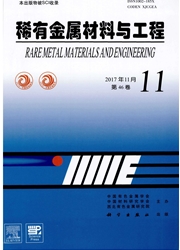

 中文摘要:
中文摘要:
采用磁悬浮熔炼-水冷铜模吸铸法制备出Ti_(40)Ni_(40)Cu_(20)非晶基复合材料板状试样,通过压力试验机对试样进行不同程度的预压缩,然后在150℃、30 min下退火,利用金相、X射线衍射(XRD)、扫描电镜(SEM)研究了预变形退火工艺对合金微观组织和力学性能的影响。结果表明:奥氏体相在外力作用下发生马氏体相变,形变诱导相变加之退火释放残余热应力从而对非晶基体起到增强增韧的作用。随着预变形程度的增加,马氏体相和奥氏体相均增加,而马氏体相增加地更快,复合材料的屈服强度提高,塑性减小,塑形阶段预变形能够实现屈服强度可控。
 英文摘要:
英文摘要:
Ti_(40)Ni_(40)Cu_(20) amorphous matrix composite plate specimens were fabricated by the levitation suspend melting-water cooled Cu mold process. The specimens were pre-compressed at different degrees with a universal testing machine and then annealed at 150 °C for 30 min. The effects of pre-deformation annealing processes on the microstructure and mechanical properties of Ti_(40)Ni_(40)Cu_(20) alloy system were studied by a metallographic microscope,X-ray diffraction(XRD) and scanning electron microscope(SEM). The results show the martensitic phase transformation that of the austenite phase under external force occurs. The phase transition induced by the deformation coupled with the annealing release of residual thermal stress plays a role in enhancing both strength and toughness of the amorphous matrix composite. Both martensite phases and austenite phases are increased with the increase with the degrees of pre-deformation increasing,and martensite phases are increased faster. Thus,the yield strength of the composite increases,while the ductility declines. Therefore the controllable yield strength in the pre-compression stage for shaping can be realized.
 同期刊论文项目
同期刊论文项目
 同项目期刊论文
同项目期刊论文
 期刊信息
期刊信息
